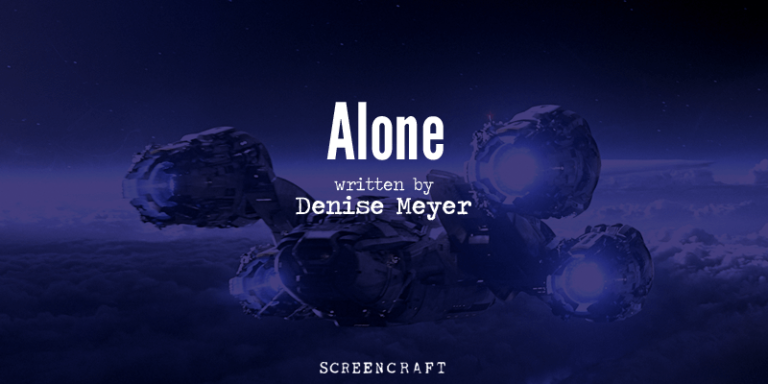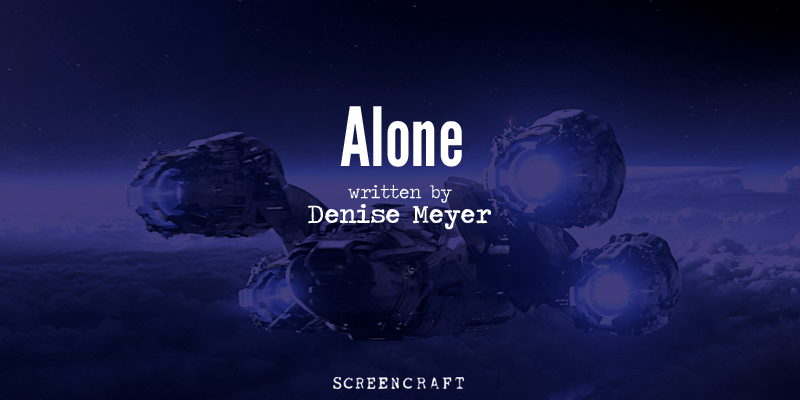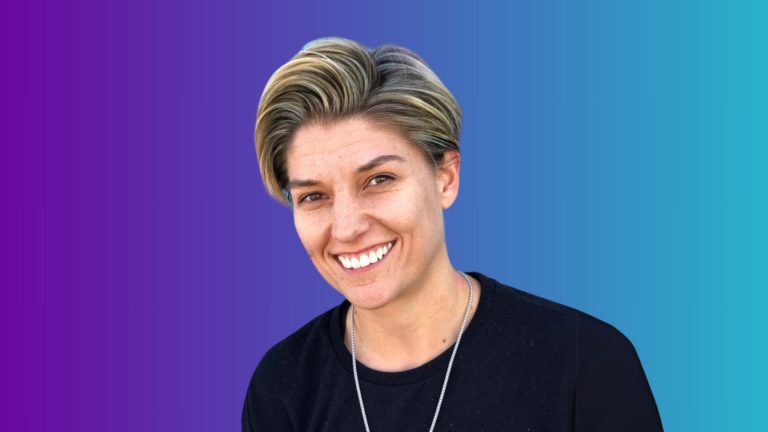
Written by Denise Meyer
“Go,” she said.
Quinn had dreaded this confrontation because he expected a tear-soaked protest, which he had steeled himself to resist. At best, he thought, Olivia would respond with fury and dismiss him with a torrent of epithets, saving her tears until after he had gone. He was sure there would be tears.
But Olivia’s black-brown eyes were dry, and her voice was steady. “I know who you are, Quinn. Your ambition is what makes you special. This is your chance to make your mark on history—you have to take it. You wouldn’t be the man I fell in love with if you passed this up, and you’d never forgive me if I asked you to.”
She was right, and they both knew it. So without another word, Quinn reached out and she stepped forward, allowing him to hold her one last time. He closed his eyes and drank in her scent, savored the comfort of her presence. But only for a moment; that was all he was entitled to. He tightened his embrace briefly as he gave her a goodbye kiss, and then he let her go. Her valedictory smile was drenched in sadness, but there were no tears.
Sixty-odd years later, when Quinn awoke with a gasp in his dimly lit hibernation chamber, his first coherent thought was of Olivia.
And there were tears.
That rude awakening turned out to be the most pleasant of the unpleasant surprises in store for Major Quinn Mead, captain and sole passenger on the Sobek IX, which was taking him further into the unknown than any man had gone before.
Quinn had fought hard for this mission. It guaranteed the name Mead would be spoken alongside names like Alexander, Columbus and Armstrong—men who had gone further than those who came before and set the standard for those who came after. This mission would make him immortal.
Quinn hadn’t though twice about sacrificing his life for a chance to live forever—until now, more than a half-century later, as he drifted alone, light years beyond where any man had traveled before, decades from the nearest human being. Decades from Olivia. He had given up his chance to grow old with her so his name would be remembered by people for generations to come, but now that he was here, close to finishing the mission that would seal his legacy, he realized that the only person that mattered was an nonagenarian woman who almost certainly had long since forgotten him. And there was nothing he could do to reach out to her now, to apologize for his selfishness, admit his mistake. Any message he sent wouldn’t arrive until she was years older than the oldest person who had ever lived.
Immortality was lonely.
But he still had a job to do. He had already completed the first part of his mission: He had survived a decades-long hibernation with all of his memory and skills intact. Now he would land on the planet Tasman Xu and investigate its viability as a colony in that unimaginable future in which hyperspace travel would make the farthest reaches of the universe accessible. He would plant an American flag on its pristine surface and transmit a report that would be received on Earth more than a century after he left.
Then his future was up to him: If Tasman Xu could support human life, he could remain there as its founding father and first settler, scraping together a living from whatever bounty the land might offer, or he could return to the Sobek IX, set a course for an even more distant unknown, retire to his hibernation chamber and sleep until the universe swallowed the ship and all its contents. He could set a course for Earth, but the Sobek IX would not get him back home. It wasn’t meant to. His name would last forever. He would disappear into eternity sometime in the next fifteen years.
Quinn had a mission, but he didn’t have much to do. Until the Sobek IX entered Tasman Xu’s atmosphere, the ship would do most of the work, just as it had for the past sixty-plus years while he slept. So he had plenty of time to contemplate his self-inflicted fate.
His training had prepared him to withstand the extraordinary isolation of a one-man mission in deep space. In fact, it had been his ability to endure long stretches in solitary confinement that led to him getting the mission. His last-standing competitor, Ham Elliston, had proved his equal in every test thrown at them. He forced Quinn to be better and stronger, to endure more than he would have thought possible. It was solitary that finally broke Ham. He had lasted more than long enough to complete the mission, but the mission would be awarded to the best man, and in the end, that proved to be Quinn. So it wasn’t the solitude that was tormenting him. It was the realization that that was all he had left, and he’d chosen it. He could remember the precise tempo of Olivia’s heartbeat when she slept beside him, but he had no idea how he could have chosen this mission over her. What had he been thinking? He could have lived forever through her if only he could have seen beyond himself.
Quinn exercised himself to exhaustion and blasted his senses with music and video to pass the time, but none of it kept the hopelessness at bay for more than a few moments. He realized, however, that this offered an upside, though a bleak one—his predicament made it easy to choose his ultimate destiny. Hibernation and oblivion were far preferable to a life of solitary toil in an uninhabited place, tormented by possibilities he had never considered until it was too late. However long he had existed, his body was still twenty-five years old. He could barely tolerate the thought of another ten days alone with his thoughts. Fifty years or more was out of the question.
He was a committed atheist, and he regretted that now, too. A believer could at least assume that God was there with him—disapproving, perhaps, but there—and might even be willing to offer absolution.
But Quinn was utterly alone, so far beyond the reach of anything or anyone even remotely familiar that no god, no man, no living thing would ever interact with him again.
This is what Quinn believed because it was unassailably true—until he was awakened from an uneasy sleep by an alarm and rushed to the ship’s control room, where he found the radar screen alive with the signals of a half-dozen objects that could only be ships. And they were heading straight for him.
———————
After the initial, visceral wave of fear subsided, Quinn realized he was hallucinating. He had to be. The only other possibility, after all, was that these ships were manned by aliens, and that was out of the question. Wasn’t it?
He certainly hoped so. He had weapons, but his little ship was no match for six. And he couldn’t flee—even if he could outrun them, where could he go? He was literally in the middle of nowhere.
With both fight and flight off the table, his options were severely limited: He could surrender and hope that he would not become a lab rat, vivisected in the name of extraterrestrial science…or he could kill himself.
Suicide seemed the wiser choice under the circumstances. That was his ultimate plan after the mission anyway, and the mission seemed hopelessly compromised at this point.
Quinn took a deep breath. There had to be other options, assuming he was in any danger in the first place. His first order of business was to determine whether this situation was, in fact, real. But it didn’t take him long to realize there was simply no way to make that determination. If he was trapped in some elaborate delusion, there was no way out; any test he conducted would ultimately be subject to his evaluation.
So that was that: He had to proceed under the assumption that there were a half-dozen ships of undetermined provenance approaching. It was extremely likely they were armed and similarly likely that whoever—or, rather, whatever—was in them would assume he was as well. He could not defeat them with the weapons he had on hand. He could make a stand anyway; they would either annihilate him or take him into custody, which seemed likely to lead to a death sentence, one he could only hope would be merciful. He could flee, though that would certainly lead to a death sentence, albeit a peaceful one. Or he could put a bullet in his brain and spare himself the horrors likely to befall him were he to end up in the custody of whatever was navigating those ships.
Quinn stared at the radar screen and watched those six ominous blips continue their journey toward the Sobek IX. What the hell were they? With a grim chuckle, he realized that only one thing was certain at this moment: If he killed himself, he would never find out.
However frightened he was of the possibility of spending his remaining days being tortured by an alien race or wasting away in a cell with no hope of ever connecting with another human being, Quinn was also insanely curious about the possibility of making contact with an alien civilization, a civilization that might even welcome him. That, too, was possible, perhaps even likely—if he surrendered peacefully.
And that was when Major Quinn Mead realized that even here, 10 trillion miles from home, he had not yet completely given up hope.
Was that enough? He had to decide quickly; the ships would have him surrounded in a matter of minutes. For the second time in his life Quinn regretted that he had no god, as he desperately wanted to pray. But he was on his own. The decision was his to make, the consequences his alone to endure.
Another alarm went off, forcing Quinn to make a call. The ship would arm itself automatically in sixty seconds if he did nothing, and then his fate would be decided for him.
The soldier in him wanted to fight, even if it meant defeat. He wanted these faceless adversaries to know he was no coward. But the astronaut and scientist in him wanted to know. And his best chance of finding out would be through surrender.
Twenty-five seconds lay between him and his fate, and they were ticking down fast.
Fight or flight? Life or death? Answers or oblivion?
Fifteen seconds…
It was the most critical moment of his life, and he again found himself thinking of Olivia. If he killed himself, he had sacrificed their future in vain. However little his life might still be worth, he owed her more than that. This was his chance to make his mark on history. He had to take it.
With alarms screaming all around him and an eerie, inhuman voice counting down from ten, Quinn calmly and deliberately typed in the code to override the arming mechanism. The ship abruptly fell silent. It would no longer help him. Quinn was totally alone.
But not for long. He had surrendered too late. The six ships were already moving in.
Quinn took another chance. He closed his eyes and prayed. But before he could express his pleas for mercy to whatever god might be listening, the Sobek IX was blasted from all sides. As consoles exploded and the ship jolted from the assault, Quinn was thrown backward. His head crashed against a bank of controls, and everything went black.
———————
Pain. Oh…God, the pain. Blinding whiteness. Eyes. Four pairs of them, wide and colorless, floating above him amidst the sea of white, staring at him in silent wonder. Quinn felt his diaphragm tense for a blood-curdling scream, but he never got the chance. He felt the sting of a needle, and he was sent back into blackness.
———————
There was no pain the next time Quinn felt consciousness dawning, but he remained still, controlled the sound of his breathing and kept his eyes closed. He seemed safe for the moment, but that could change as soon as it was clear he was awake. So he would lie and listen. And pray.
It did not take long for his prayers to be answered. He heard the click of a door latch—not preceded by the sound of a lock, he noted—followed by soft footfalls and the gentle rustle of clothing as one of his as-yet-unseen hosts approached. A series of quiet clinks suggested someone checking monitoring devices. Quinn’s curiosity was piqued, but he forced himself to continue pretending he was unconscious, even as he felt the soft, warm touch of what he would have sworn was a woman’s hand on his forearm. It lingered there, its purpose apparently nothing more than a tacit, anonymous offering of comfort. Quinn desperately wanted to open his eyes and find out once and for all what sort of creatures he now dwelled among, but he was determined to maintain his ruse until he was certain of his surroundings. The touch remained as he heard the door latch click again.
“Any change?” said a voice from the other side of the room. Male. Latin accent. Human.
“No,” said Quinn’s companion. Female. American accent. Human.
It wasn’t possible that he was among his own kind. It was a trap. But Quinn had to know; he opened his eyes with a swift, soft intake of breath.
“Oh!” exclaimed his companion, a pretty young nurse, as she gave his forearm a reassuring squeeze. “Hello there. You gave us quite a scare.”
Quinn, trying to process what he was seeing, stared at her and the middle-aged doctor who rushed to her side when it was clear Quinn had awakened. Their smiles faded into looks of concern when Quinn failed to respond with a word or even an expression of recognition.
“Can you speak?” the doctor asked. “Can you tell us your name?”
“Major Quinn Mead,” Quinn finally managed, his voice quiet and rough.
The nurse and doctor seemed pleased.
“What happened to me?” Quinn asked, wincing as he ran his hand gently along the right side of his skull.
“You suffered a head injury,” the doctor told him. “We expect you to make a full recovery, but we’re going to keep you here for another day or two just to make sure you’re all right.”
“Where’s ‘here’?” Quinn asked.
“You’re in a hospital,” The doctor replied.
Quinn shook his head in frustration. “What planet?”
The nurse and doctor exchanged a look.
Quinn swallowed hard. Had everything been a delusion? “Tell me,” he demanded.
“You’re on Tasman Xu,” the nurse said softly. “Where did you think you were?”
Icy tentacles worked their way up Quinn’s spine as his eyes widened in horror, and one of the monitors sounded a shrill alarm as his blood pressure spiked dangerously. The nurse and doctor sprang into action. Quinn fought them with all he had.
“This isn’t real!” he screamed. “It’s not real!”
Quinn continued to scream as more personnel rushed into the room and forced him into restraints while the doctor injected sedatives into his IV. And he continued to scream after that, but not for long.
———————
When Quinn again opened his eyes, he had no idea whether minutes or months had passed. His wrists and ankles were still lashed to the bed, and the room appeared the same. Absolutely nothing that had happened since he was awakened by the alarms on the Sobek IX made any sense at all, but Quinn conceded that, for a delusion, it was impressively linear.
He tested the restraints; they offered little give. He closed his eyes and focused all his energy on waking up—really waking up—and escaping this nightmare, though he soon realized that he could no longer say with any certainty at all where he’d left reality behind. Had there ever been a mission at all? Had he completed his mission and returned to the hibernation chamber on the Sobek IX? Had he never physically awakened from hibernation in the first place? He could feel his heartbeat quickening as these thoughts tormented him, and he struggled to set them aside. Panic was definitely not an option.
He took a few deep breaths and willed himself to calm down, only to be startled by the click of the door.
Quinn expected the nurse, but his visitor was a matronly woman with a soothing voice and an eagle on her shoulder. She introduced herself as Colonel Seaberg and told Quinn she was a psychologist doing a routine evaluation as she made herself comfortable in a chair beside Quinn’s bed and pulled out a little device, which she raised to Quinn’s eye line.
“Do you mind?” she asked.
“What is it?” Quinn replied.
The question astonished her, but only for a second. “It’s a recorder,” she told him. “May I?”
Quinn gave his permission with a nod. After some frustrated tinkering, she got it working and set it on the table next to the bed, then leaned back and gave him a smile that was oddly comforting despite being thoroughly false.
“Is there anything you’d like to ask me?” she said.
Quinn offered a fake smile of his own and shook his right wrist just enough to make the bed frame squeak softly. “Are these really necessary?”
“No,” she responded.
This surprised him, and it was obvious, which seemed to amuse her. She rose and undid the restraint on his left wrist, then released his ankles while he freed his right arm.
“Thank you,” he said quietly as he gingerly touched his skull, then ran his hand along his jaw line. His injury was healing, but he needed a shave.
“You’re welcome,” the Colonel replied, watching him. “Is there anything else you’d like to ask me?”
“How long have I been here?” he asked.
The Colonel tapped at a handheld computer for a few seconds. “Four days.”
Quinn met her gaze and held it. After a moment passed, it was clear she would neither rush him nor offer any information he didn’t ask for.
“Where am I?” he asked, hoping that, this time, he would be told the truth.
“St. Joseph’s Hospital in Elliston, the capital city of Tasman Xu,” she told him matter-of-factly, though she was watching him intently.
He was watching her intently, too. “That’s not possible,” he said calmly. “I was on a mission to Tasman Xu. The first mission to Tasman Xu. I left in 21—”
“You left in 2168,” Colonel Seaberg interrupted, without having to consult her device. “It’s now 2234.” Her professional demeanor cracked slightly as she studied him with genuine sympathy. “A lot can happen in sixty-six years,” she added.
Quinn’s jaw dropped slightly. Her implication was clear, but…“That’s not possible,” he said again. “Hyperspace travel—it’s science fiction.”
“It was in 2168,” the Colonel replied gently. “By 2175, it was a reality.”
Disbelief flooded Quinn’s expression. After a few beats, it hardened to bitterness as the few pieces of information he had fell into place. “They sent Ham Elliston.”
This completely surprised the Colonel. “You’ve heard of Ham Elliston?”
Quinn scoffed. “Elliston is the guy I was competing with for the original mission. And I won. I was supposed to be the first man here. This city should be named for me.”
The Colonel’s eyes remained sympathetic, but her tone was cool and professional. “You survived, Major Mead, and for all intents and purposes you’re still twenty-five years old, young enough to find another way to make history, if that’s your life’s goal. Ham Elliston won’t stand in your way. He’s been dead for thirty years.”
That revelation took the wind right out of Quinn. He’d gotten so caught up in his own confusion and frustration he hadn’t stopped to think about what this new reality meant. He did some quick math. Ham Elliston, who had been in his prime when Quinn last saw him, had lived into his sixties and been dead for longer than Quinn had been consciously alive.
And Olivia! He hadn’t dared to think about her since arriving here for fear he really would lose his mind. But now that he knew where—and when—he was, he immediately became obsessed with the idea of finding her, if only to tell her how sorry he was. She would be in her early nineties, but people routinely lived twenty, even thirty years beyond that. Could he possibly see her again?
“Can I go back to Earth?” Quinn asked the Colonel abruptly.
The Colonel shrugged. “It’s a free colony. But there are more opportunities here for an ambitious young man. Why would you want to go back?”
“How long is the trip?” Quinn continued. He had heard the Colonel’s question, but he didn’t feel like answering it.
The Colonel studied him for a few seconds, then turned to her handheld, scrolling through information, looking for something as she responded. “It takes nine months to a year.”
“Jesus,” Quinn murmured. Sixty-five years less than it had taken him to get here. But even if Olivia were alive, a year might still be too long.
The Colonel had either found what she was searching for or had given up and turned her attention back to Quinn. “What was her name?”
Quinn met her gaze but said nothing.
“According to your file, your parents died before you graduated college. No siblings, no family ties on record. So I’m going to make an educated guess and assume you left a girlfriend behind, and that’s why you’re interested in returning to Earth.”
Quinn broke eye contact. He didn’t want to tell this stranger about Olivia. All he wanted now was to get the hell out of here and find her.
But the Colonel wasn’t about to let him off the hook. “Boyfriend, then?”
Quinn didn’t rise to the bait.
The Colonel sighed. “I’m going to recommend you be discharged,” she told him. “The evaluation’s over. But it’s still in your best interest to answer the question.”
When Quinn remained silent, she retrieved her recording device, snapped it off and dropped it into a pocket as she stood.
“This room probably has you convinced the world hasn’t changed much,” she said. “But it’s a false impression. Things don’t work like they did the last time you were a part of it. You’ll catch up, but you’re going to need time, and you’re going to need help. Your pension will be enough to live on for a while, and you’ll get some support from the veterans’ office, but you’re all alone in this world. Once you’re discharged, you’re going to have too much to do to hunt down a woman who hasn’t seen you in almost seventy years—assuming you had the first idea how to find anyone in this day and age.”
Quinn’s expression changed as he absorbed this.
“Tell me her name, Major, so I can help you find her.”
Quinn bowed his head briefly, then looked up at her. “Olivia Valcàrcel.”
The Colonel’s eyes widened slightly, but she quickly recovered and nodded. “All right, Major. I’ll see what I can do. Get some rest. You’re going to need it.”
Quinn took her advice. He had been under constant stress since awakening in the hibernation chamber, but now, in spite of the challenges ahead, he felt in control of his future. He lay back and closed his eyes, and for the first time since he had returned to the realm of the living, thoughts of his future did not torment him.
———————
“Major Mead,” the nurse said, shaking him awake. “Major?”
Quinn blinked the sleep out of his eyes and frowned when he saw the nurse’s anxious look. “What’s wrong?”
She was already pulling his uniform from the closet. “The governor wants to see you. An escort is arriving in thirty minutes.”
Quinn’s frown deepened; he didn’t know what time it was, but the window was black. “Why would he want to see me? What’s going on?”
The nurse draped his uniform over the chair and set his shoes beside it. “Do you need help getting dressed?”
“No, but—” Quinn began, but “no” was all the nurse cared to hear. She headed for the door.
“You don’t have much time, Major. And you really need a shave. You’ll find everything you need in the bathroom. I’ll be back in twenty minutes.” And with that, she left.
Exactly twenty minutes later, the nurse returned with a wheelchair and smiled at the sight of the freshly shaved and dressed Quinn. “You look like the old photos of my grandfather,” she said, only to quickly apologize when she saw Quinn’s reaction. “I meant it as a compliment, Major,” she said quietly, brushing off his shoulders. “Have a seat. We’ve got ten minutes, and we’ll need them all.”
After a quick stop at the reception desk so Quinn could sign his discharge forms, the nurse wheeled him to the elevators. It was his first experience outside his room since he had arrived, but everything was quiet and orderly—it might as well have been 2168 for all hospitals seemed to have evolved.
Then they got on the elevator. “Ground floor,” the nurse said, at which point the doors closed and a display began counting down the floors—from 422.
Quinn actually leaned closer to the display to make sure he was reading it correctly, though in the time it took him to make that small move, they had descended more than eighty floors.
When the doors opened again, releasing them into the building lobby, Quinn was dumbstruck. It was daytime here, and the lobby was bustling with what he assumed were businesspeople, though he couldn’t make sense of the fashions. Many were walking alone but chatting away, though he saw no phones or headsets.
“I thought it was nighttime,” he whispered to the nurse as they headed toward the main entrance.
She looked at him quizzically for a beat, then glanced at his outdated uniform and smiled as if she were dealing with a toddler. “We use tinted windows to mimic nighttime as needed,” she explained. “Days here are fifty-five hours long.”
“What time is it?” Quinn asked.
“It’s the middle of the night as far as you’re concerned,” she told him. “But those of us who were born here have adjusted. And you will, too. Eventually.”
Quinn found the pneumatic hiss of the opening door an unexpected comfort in this foreign place, but the moment quickly passed, and he found himself in a world brighter, louder and faster than anything he ever considered possible.
The nurse wheeled him to a waiting limousine, wished him well and handed him off to a burly man in a black suit who ushered him into the vehicle. Seconds later, they were swiftly and quietly driving past innumerable skyscrapers, the tops of which Quinn couldn’t see from inside the car.
He turned his attention to his immediate surroundings and, after some fumbling, managed to turn on a small video device, which was playing a news broadcast.
News, at least, hadn’t changed. Crime, scandal, war, the economy—different details, same miseries. He watched it blankly, mesmerized by the shots of his new world, barely listening to the stories.
“Coming up next, Governor Elliston announces a new job plan,” the newscaster said just before the broadcast cut away to a commercial for some new drug.
Had he heard that right? He jabbed his finger at the screen, willing it to offer him a rewind option, but nothing worked. And then the car stopped.
———————
Quinn had heard it right. After what seemed an hour’s walk through a maze of corridors behind a stark woman whose only words to him were “follow me,” Quinn was led into a richly appointed room, announced and abandoned.
“Ah, Major Mead. Thanks for coming on such short notice. Governor Ham Elliston Junior. Pleasure,” said the robust man who strode from his desk to the door, hand extended, to greet Quinn.
“Pleasure’s all mine, sir,” Quinn replied.
The two men eyed one another as they shook hands. Quinn estimated his host to be in his mid-sixties, though his silver hair was thicker than Quinn’s, and his grip was formidable. No doubt he’d gotten his position thanks to his name, but he looked like a man who wouldn’t take no for an answer under any circumstances.
“Have a seat, Major,” Elliston said. “Drink?”
Quinn nodded as he took a seat in a leather chair. “Whatever you’re having.”
Quinn made a quick study of his surroundings while Elliston was at the bar. Everything about the environment and Elliston’s demeanor oozed money and power. His old rival may have been dead for thirty years, but if this room were any indication, Ham Elliston had secured himself one hell of a legacy, not only through his own achievements but though those of his son. Quinn could only wonder at the way things had played out—all those months he had pushed himself to the limit to prove he was better than Ham to get the coveted Sobek IX mission only to be sitting here, several generations later, surrounded by evidence that he had won the battle but lost the war. He assumed Ham had reveled in that irony.
Elliston handed Quinn a cocktail, then sat across from him and raised his own identical glass. “Welcome back to civilization, Major Mead.”
Quinn nodded his thanks and raised his glass, then took a drink. The taste caught him completely off-guard, and it showed.
“Is something wrong?” Elliston asked.
Quinn shook his head and, to underscore the point, took another draught before setting the glass on the table between them. “Dry Rob Roy was always my poison of choice,” he told the older man.
Elliston smiled. “Ham Senior always said you were a good man.”
Elliston’s smile seemed genuine—then again, he was a politician. But there was an edge to his voice. It was subtle, and it didn’t sound like a threat, but it put Quinn on alert. On the other hand, it also gave him the opening he had been looking for to ask the question that had been nagging him for more than an hour.
“Is that why I’m here, Governor? Because of your father?” Quinn asked, making an effort to keep his tone honestly curious rather than challenging. He knew nothing of Elliston other than what he had observed in the past few moments, but it was clear he was not someone to be crossed, and a man who had no friends could not afford enemies.
Elliston’s smile widened, betraying a hint of darkness. “Were you hoping for accolades?”
Quinn frowned. “Sir?”
“You paid the ultimate price for being a pioneer,” Elliston said. “Trumped by a man who wasn’t your equal simply because he was available when technology improved.”
Quinn’s frown deepened. Whatever Elliston’s agenda, it was clearly personal. But what on Earth—or Tasman Xu—could he have against Quinn, whose bad timing had paved the way for two generations of Ellistons to conquer this new world?
“Your father deserved that mission as much as I did,” Quinn responded carefully. “If I was ‘better,’ it’s only because he forced me to be.”
Elliston had a good, long laugh at that. “I certainly don’t have to worry about any competition from you,” he said coldly. “You’re no politician.”
Elliston’s increasing venom unsettled Quinn. He was certain he was in no physical danger, but he was trapped nonetheless. He had gotten here courtesy of Elliston’s driver, and even if he had someone to call—if he even knew how to place a call—he had nowhere to go but a hotel room he had not yet rented.
Quinn struggled to appear confident, but this only seemed to fuel Elliston’s inexplicable rage. “Do you regret it?” Elliston asked.
Regret had haunted Quinn since he awoke from his sixty-six year sleep, but he was not about to admit that to anyone, least of all Elliston. But he admitted it in spite of himself when he broke Elliston’s gaze.
But Elliston apparently wanted to hear him say it. “Do you regret it?” he repeated. “I was your age once. I understand why you wanted that mission. But was it worth the price?”
Quinn’s eyes flared. “Your father—and you—ought to thank me for taking that mission.”
Elliston glowered at him. “You don’t know the first thing about me, Mead. You don’t know a single goddamn thing. So I’ll tell you something: I’m sixty-five years old, and for as long as I can remember, I’ve regretted that you took that mission.”
Quinn’s anger was now matched by confusion. “If I hadn’t taken it, your father would have.”
Elliston eyed him with utter contempt. “Ham wasn’t my father. You were.”
Quinn stared at him for a moment, then rose, shaking his head. “I don’t know what kind of game you’re playing, but I’ve had enough.” He headed for the door. He had no idea how he would find his way out of this labyrinthine mansion, never mind where he would go once he got out, but he couldn’t tolerate another minute in this room.
“You asked if you were here because of my father,” Elliston called after him. “You’re not. You’re here because of my mother, Olivia Valcàrcel.”
Quinn froze.
“Colonel Seaberg called me and said one of her patients claimed to have been my mother’s boyfriend,” Elliston continued. “She thought you’d heard Olivia’s name somehow, knew she was Ham’s wife and was having a laugh at her expense, but she called my office anyway.”
Quinn turned to face Elliston but stayed where he was. “Is she alive?”
Elliston looked him in the eye for a long moment, then polished off his drink. “Ham never said a bad word about you,” Elliston said, “but when I got old enough to understand, my mother told me everything.
“She didn’t want to hold you back, but she didn’t want to raise a child alone, either. So she married Ham and let him give me his name. She regretted that. And do you know why?”
Quinn couldn’t even shake his head in reply. He was certain he’d collapse if he moved a single muscle.
Elliston’s expression blackened. “Because Ham was a good man, Mead. He raised a son who wasn’t his and loved a wife who couldn’t love him back. Because he was there, and he did your job, but he still wasn’t your equal.”
Quinn finally found his legs and walked back toward Elliston, grabbing the back of the chair he had abandoned less than a minute earlier, before his world had shattered. “Is she alive?”
Elliston glared at him. “My mother lived with that regret every single day. Do you regret it, Mead?”
Quinn nodded and bowed his head, blinking back tears. “Since the moment I woke up on the ship.”
Elliston exhaled slowly but said nothing for a moment that seemed to Quinn to stretch for an eternity. “Good,” he said finally.
Elliston rose and headed to his desk, where he jabbed at an intercom. “Mrs. Tan, please see Major Mead out.”
Whatever resentment, anger and confusion Quinn had felt before, it was gone, every bit of it. Now he was consumed only with panic and desperation. “She’s alive, isn’t she? I have to see her,” Quinn begged. “Please.”
Mrs. Tan, the stark woman who had silently led Quinn in, entered after a sharp knock. Elliston was already back at work, reading something on a computer. He didn’t look up. Quinn didn’t move.
“Major Mead,” Mrs. Tan said flatly.
“Governor, I’m begging you. Let me see her. Let me tell her I’m sorry,” Quinn pleaded.
“Should I call security, sir?” Mrs. Tan asked.
Elliston finally looked up and, with a shake of his head, kept Mrs. Tan from taking action. Then he turned his gaze to Quinn, who immediately understood that his pleas had and always would fall on deaf ears. Confident that Quinn had finally gotten the message, Elliston turned back to his work.
“Go,” he said.
THE END
Get Our Screenwriting Newsletter!
Get weekly writing inspiration delivered to your inbox - including industry news, popular articles, and more!



























